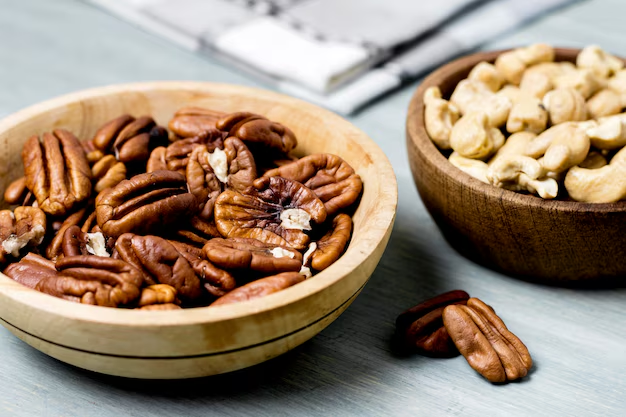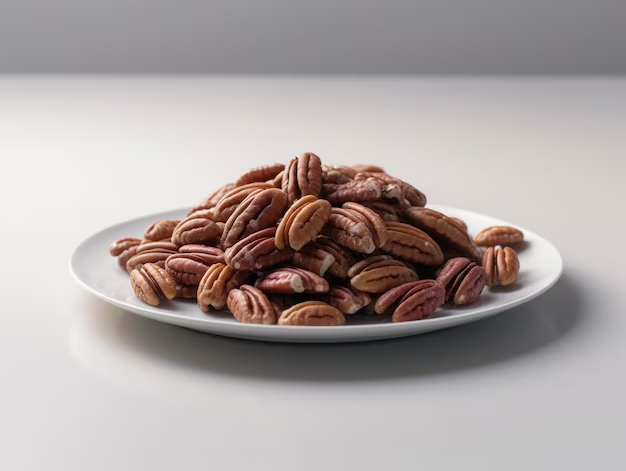Pecans are a beloved addition to many diets, especially in the United States. Their unique flavor and versatility make them a staple in pies, salads, and snacks. But are pecans healthy? This question often arises for those aiming to maintain a balanced diet. In this article, we’ll delve into the nutritional profile of pecans and explore their health benefits. Let’s discover why these nuts deserve a place in your meals.
Understanding Pecans
Pecans have a rich history and an equally rich nutritional profile. Let’s break it down to understand their origins and composition.
What Are Pecans?
Pecans are the edible seeds of the pecan tree, a species native to North America. Scientifically known as Carya illinoinensis, pecan trees thrive in warm climates, especially in southern parts of the U.S. Historically, they have been a dietary staple for Indigenous peoples due to their nutritional value and ease of storage. Today, pecans are a favorite in many households, celebrated for their buttery taste and nutrient density.
Nutritional Profile of Pecans
Pecans pack a nutritional punch in a small serving. Here’s what you’ll find in just one ounce (about 28 grams) of pecans:
- Calories: ~200
- Protein: 3 grams
- Fat: 20 grams (mostly healthy unsaturated fats)
- Carbohydrates: 4 grams
- Fiber: 3 grams
- Micronutrients: Rich in manganese, copper, thiamine, and zinc.
Pecans are also cholesterol-free and low in sodium, making them an excellent choice for heart health.
Health Benefits of Pecans
Pecans aren’t just tasty; they come with a host of health benefits. Here’s a detailed look at what they offer.
Heart Health
Pecans are good for your heart. They are rich in monounsaturated fats, similar to those found in olive oil, which can lower bad cholesterol (LDL) levels. Additionally, their high content of antioxidants, like ellagic acid, protects the heart from oxidative stress. Studies suggest that regular consumption of pecans may reduce the risk of heart disease and improve overall cardiovascular health.
Blood Sugar Control
Pecans can help regulate blood sugar levels. Their low carbohydrate content, coupled with high fiber and healthy fats, slows digestion and prevents spikes in blood glucose. Research has shown that including pecans in meals can enhance insulin sensitivity, making them a smart choice for individuals with diabetes or those aiming to prevent it.
Weight Management
Despite being calorie-dense, pecans can aid in weight management. The combination of fiber, protein, and healthy fats promotes feelings of fullness, reducing the likelihood of overeating. Their satiating nature makes them an ideal snack for those on a weight loss journey. Plus, the body tends to burn more calories digesting nuts, which further supports weight control.
Antioxidant Properties
Pecans are packed with antioxidants, ranking high among nuts in their antioxidant content. These compounds neutralize free radicals in the body, reducing inflammation and preventing cellular damage. The presence of vitamins A and E further enhances their ability to fight oxidative stress, potentially lowering the risk of chronic diseases like cancer.
Brain Function
Pecans may also benefit cognitive health. Their high levels of vitamin E, along with other antioxidants, protect brain cells from damage. Additionally, the healthy fats in pecans support the structure and function of brain membranes. Regular consumption of pecans has been linked to improved memory and a reduced risk of neurodegenerative diseases like Alzheimer’s.
Related to Read: Maple Pecans Recipe
Comparing Pecans to Other Nuts
While pecans shine in many areas, how do they stack up against other popular nuts?

Pecans vs. Walnuts
Both pecans and walnuts are nutrient-dense, but they have notable differences:
- Fat Content: Pecans contain more monounsaturated fats, while walnuts are rich in omega-3 fatty acids.
- Flavor: Pecans have a sweeter taste, whereas walnuts are slightly bitter.
- Health Benefits: Walnuts are better for brain health due to their omega-3 content, but pecans excel in antioxidant capacity.
Pecans vs. Almonds
Almonds and pecans are both excellent sources of nutrition, but here’s how they differ:
- Calories: Almonds have fewer calories per ounce (~160) compared to pecans (~200).
- Fiber: Almonds are higher in fiber, promoting better digestion.
- Micronutrients: Pecans offer more zinc and manganese, while almonds are a richer source of calcium.
Potential Downsides of Pecans
While pecans are a nutritional powerhouse, there are a few considerations to keep in mind before adding them to your diet. Understanding these potential downsides will help you enjoy pecans in a healthy and balanced way.
Allergies
Tree nut allergies, including those to pecans, are a common concern.
- Symptoms: People allergic to pecans may experience symptoms like itching, swelling, difficulty breathing, or even severe anaphylactic reactions.
- Precautions: If you suspect a pecan allergy, consult a healthcare professional and avoid all tree nuts until further evaluation. For those with known allergies, it’s crucial to read food labels carefully, as pecans can often be found in baked goods, granola mixes, and even sauces.
- Alternative Options: If you’re allergic to pecans, consider seeds like sunflower or pumpkin seeds as substitutes. These provide similar nutritional benefits without triggering a tree nut allergy.
Calorie Considerations
Pecans are calorie-dense, which can be both a pro and a con.
- High-Calorie Content: Just one ounce of pecans contains approximately 200 calories. While these calories come from healthy fats, overindulging can lead to excessive calorie intake.
- Portion Control: To avoid weight gain, stick to a single serving (about a small handful) per day. Using a kitchen scale can help measure portions accurately.
- Balancing Calories: Pair pecans with low-calorie foods like fresh fruits or vegetables to enjoy their benefits without exceeding your daily caloric needs.
Incorporating Pecans into Your Diet
Pecans are not only nutritious but also versatile. They can easily fit into a variety of meals and snacks. Let’s explore how to make the most of these delightful nuts.
Healthy Serving Sizes
Knowing the right portion size is essential to reap the benefits of pecans without overconsuming calories.
- Daily Recommendations: Experts suggest consuming about 1 ounce (roughly 15–20 pecan halves) per day.
- Moderation Is Key: While pecans are healthy, eating too many can lead to excessive fat and calorie intake. Spread out your servings throughout the week rather than consuming them all at once.
- Mindful Eating: Instead of mindlessly snacking on pecans from the bag, measure your portion ahead of time to avoid overeating.
Delicious and Healthy Pecan Recipes

Adding pecans to your diet doesn’t have to be boring. Here are some creative and healthy ways to enjoy them:
- Breakfast Boost: Sprinkle chopped pecans over oatmeal, yogurt, or smoothie bowls for a crunchy and nutritious start to your day.
- Salads: Add pecans to green salads with ingredients like spinach, goat cheese, and dried cranberries. Their buttery flavor pairs perfectly with a tangy vinaigrette.
- Snacks: Roast pecans with a sprinkle of cinnamon and a dash of sea salt for a tasty snack.
- Baking: Use pecans in muffins, bread, or healthy granola bars for added texture and flavor.
- Main Dishes: Incorporate pecans into savory dishes like pecan-crusted chicken or fish for a protein-packed meal.
Are Pecans Keto-Friendly?
Yes, pecans are an excellent choice for a ketogenic diet.
- Low in Carbs: Pecans contain only about 4 grams of carbohydrates per ounce, with most coming from fiber. This makes them suitable for low-carb diets like keto.
- Healthy Fats: They are rich in healthy fats, which are a cornerstone of the ketogenic lifestyle. The high fat content helps maintain energy levels while keeping carbs minimal.
- How to Use: Add pecans to keto-friendly desserts, fat bombs, or enjoy them as a snack to meet your macros.
Do Pecans Affect Cholesterol Levels?
Yes, pecans can positively impact cholesterol levels.
- Lowering LDL: Studies have shown that regular consumption of pecans can reduce LDL (“bad”) cholesterol levels, thanks to their monounsaturated and polyunsaturated fats.
- Increasing HDL: Pecans may also help raise HDL (“good”) cholesterol, promoting overall heart health.
- Practical Tip: For the best cholesterol-lowering effects, replace unhealthy snacks with pecans or add them to heart-healthy meals like salads and whole grains.
Related to Read: Gingerbread Pecan Almond Butter
Conclusion
Pecans are a delicious and nutritious addition to any diet. They offer numerous health benefits, from improving heart health and managing blood sugar to providing essential nutrients and antioxidants. While they are calorie-dense, mindful portion control can help you enjoy their benefits without overindulging. Whether sprinkled on your breakfast, added to salads, or used in creative recipes, pecans are a versatile and satisfying choice.
So, are pecans healthy? Absolutely! Incorporate them into your diet in moderation, and enjoy their natural goodness while reaping their health benefits.
FAQs
How can I avoid overeating pecans?
Stick to a single serving (about 1 ounce) per day. Pre-portion your snacks and pair pecans with other healthy foods to avoid overindulging.
Can children eat pecans safely?
Yes, but always introduce them carefully due to potential allergies. Crush pecans into smaller pieces to prevent choking hazards for younger children.
Are pecans better raw or roasted?
Both are nutritious, but raw pecans retain more antioxidants. If roasting, do so at a low temperature without added oils or sugars.
Do pecans expire?
Yes, pecans can go rancid due to their high fat content. Store them in an airtight container in the refrigerator or freezer to extend their shelf life.

